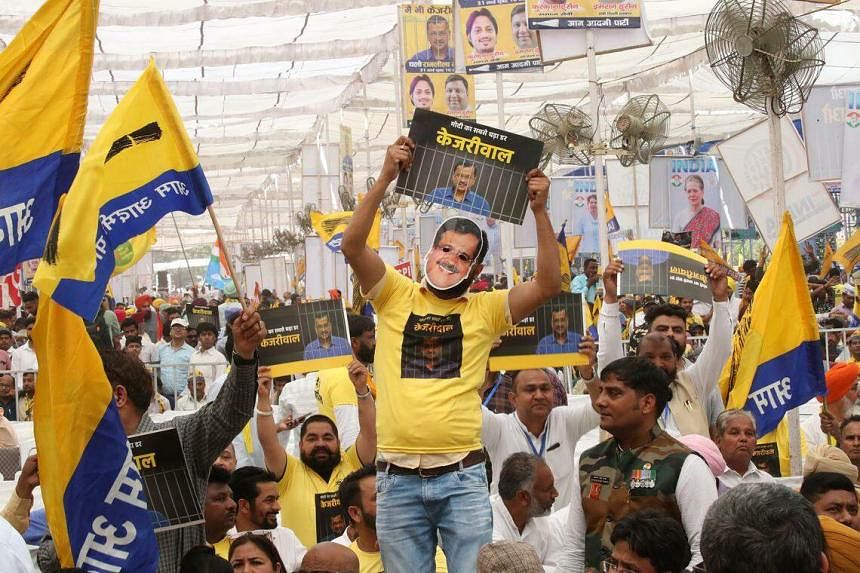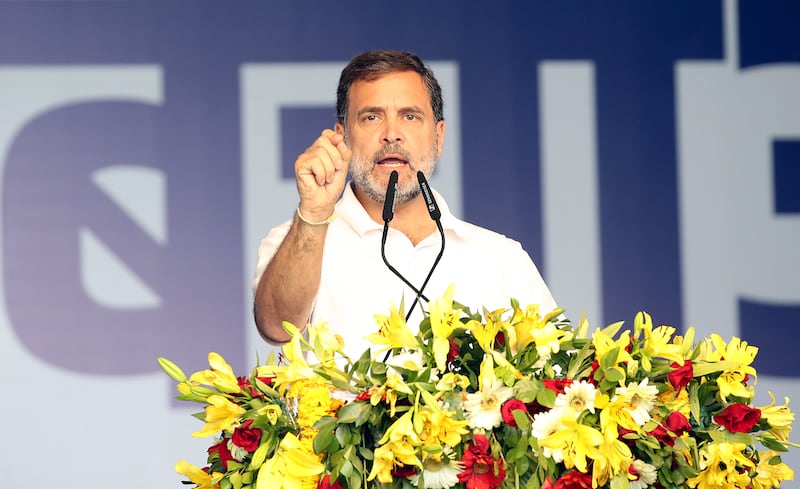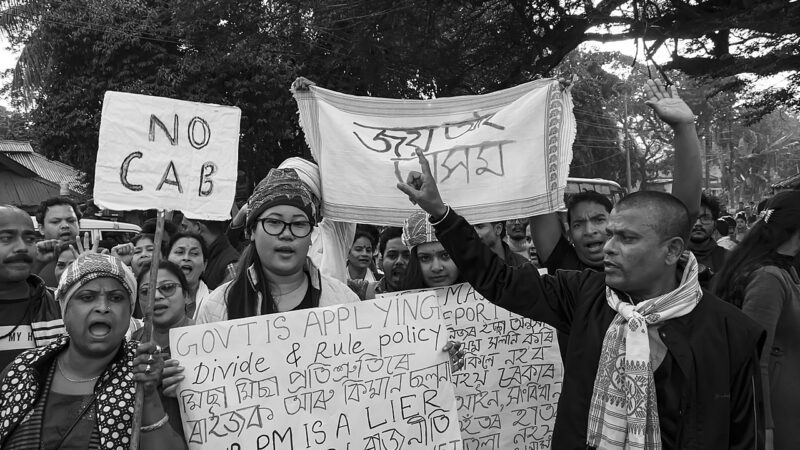MAR 31, 2024
NEW DELHI - Indian opposition parties united on Sunday to protest against the arrest of a prominent leader weeks before a national election, accusing Prime Minister Narendra Modi and his party of rigging the vote and harassing them with large tax demands.
"Narendra Modi is trying match-fixing in this election," Congress party leader Rahul Gandhi told a New Delhi rally as the crowd chanted "Shame!"
Delhi Chief Minister Arvind Kejriwal, a staunch Modi critic, anti-corruption crusader and a high-profile leader of the 27-member "INDIA" opposition bloc, was arrested on March 21 for alleged graft over granting liquor licenses, less than a month before voting starts in a general election widely expected to solidify Modi's mandate with a rare third term.
Kejriwal's Aam Aadmi Party says the case is fabricated and politically motivated. Modi's government and his Bharatiya Janata Party (BJP) deny political interference and say law enforcement agencies are doing their job.
"If the BJP wins this match-fixing election and changes the constitution, it will light the country on fire," said Gandhi, whose party ruled India for more than two-thirds of the time since independence in 1947 but has struggled since Modi swept to power a decade ago.
"This is not an ordinary election. This election is to save the country, protect our constitution."
Sharing the stage with Gandhi at the popular Ramlila Maidan gathering site were opposition leaders including regional party heads who have overcome differences over which party would contest which seats.
Yes, I would also like to receive SPH Media Group's
SPH Media Limited, its related corporations and affiliates as well as their agents and authorised service providers. marketing and promotions.
Modi said his fight against corruption has rattled the opposition and this election is a fight between his party and its allies who want to remove the corrupt, compared with the opposition that wants to protect the corrupt.
"Big corrupt people are behind bars and even the Supreme Court is not giving them bail," Modi said in a rally to launch his election campaign in the populous northern state of Uttar Pradesh on Sunday.
Congress, besides struggling with detentions and raids by India's financial crime-fighting agency, says it faces "tax terrorism" from large tax demands by the government and the freezing of some of its bank accounts, all of which it calls attempts to financially cripple the party.
Critics say Modi and his party have weaponised investigative agencies and tax authorities to cull political opponents and reduce the chances of a fair election, an accusation the BJP denies.
"This fascism will not work in India," Kejriwal's wife, Sunita Kejriwal, told the rally. "We will fight and we will win."

Nirmala Ganapathy
India Bureau Chief
MAR 31, 2024
NEW DELHI - India’s rainbow opposition alliance put up its strongest show of unity yet at a “Save Democracy” rally on March 31, hoping to convert recent run-ins with government agencies into electoral support.
Opposition parties have accused Prime Minister Narendra Modi’s Bharatiya Janata Party (BJP) of using investigating agencies to stymie their campaigns by cutting off funds and arresting leaders, weeks before the general elections. India will vote in seven-phase elections starting on April 19, with official results expected on June 4.
The Indian National Developmental Inclusive Alliance, or India, comprises more than two dozen opposition parties across the country.
Opposition heavyweights from across the country shared the stage in a show of strength to protest against the arrest of Delhi Chief Minister Arvind Kejriwal by the Enforcement Directorate on March 21 on a graft charge related to the sale of liquor, and the freezing of several bank accounts of the Congress party by the income tax department.
Gandhi siblings Rahul and Priyanka of the Congress party, Samajwadi Party chief Akhilesh Yadav, and Peoples Democratic Party chief Mehbooba Mufti were among the dozens of opposition leaders who addressed the rally at Ramlila Ground in New Delhi.
“This election is not about votes. It’s about saving the Constitution,” Mr Gandhi told the rally.
In February, the income tax department froze Congress’ bank accounts on charges of delays in filing tax returns. Mr Gandhi said the inability to fund its election campaign had “crippled” it.
The tax department on March 29 demanded 1.35 billion rupees (S$21.8 million) in fines for the income tax infractions between 2017 and 2021.
“Why couldn’t this be done six months later, and (instead of) just before the elections?” asked Mr Gandhi.
The opposition alliance has now asked the Election Commission to ensure a “level playing field” for all parties.
Former Jharkhand chief minister Hemant Soren, whose party Jharkhand Mukti Morcha is in the opposition alliance, is also in jail over an alleged land scam. He was arrested in January.
The BJP has denied any political motivation behind the investigations against opposition leaders, which have also attracted rare criticism from the United States.
Twice, the US expressed concern over the arrest of Kejriwal, leading to a diplomatic protest by India. On March 29, a US state department spokesperson said the US encouraged “fair, transparent and timely legal processes for each of these issues”. India reacted by calling the remarks unwarranted and added that “such external imputation on our electoral and legal processes is completely unacceptable.”
Mr Stephane Dujarric, the spokesman for UN Secretary-General Antonio Guterres, told reporters in response to a question that he hoped “everyone is able to vote in an atmosphere that is free and fair”.
Kejriwal’s arrest in particular has received widespread international and domestic coverage. The Delhi chief minister had built his party on an anti-corruption wave that swept the country over a decade ago, and had slowly but steadily increased his political influence on a mix of soft Hindu nationalism and focus on education and health.
The 55-year-old politician, who has been working to expand the political influence of his Aam Aadmi Party (AAP), has remained defiant and said that he would continue to run Delhi from jail. He has continued to issue orders, including to ensure water supply in areas that saw shortages.

Kejriwal’s wife, Ms Sunita Kejriwal, a former income tax official, has come to the fore, expressing concern about her diabetic husband’s incarceration.
At the rally, she read out her husband’s fresh poll promises to the country, including uninterrupted 24-hour electricity supply, free electricity for the poor nationwide, and the building of government schools in every village and neighbourhood.
At the rally, AAP supporters said that putting Kejriwal in jail would not deter the party or its workers.
“If he (Kejriwal) is guilty, put him in jail. But it has to be proven. You can’t just pick someone up and throw them in jail,” said AAP worker Meena Sharama, 60, from the state of Punjab. AAP is in power in Delhi and Punjab.
Analysts said there was no doubt that the arrest of Kejriwal, in particular, had unified the opposition.
But journalist and author Nilanjan Mukhopadhyay noted that with him in jail, AAP had lost its key campaigner.
“During the election campaign, it is important to draw crowds. The leadership of AAP is essentially personality-centric around Mr Kejriwal,” said Mr Mukhopadhyay.
He noted: “The party will waver a bit. But eventually the spirit of the party would enable new leadership to take charge as a stopgap arrangement.”
Opinion polls have predicted a landslide win for the BJP, which needs a minimum of 273 out of the 543 elected seats in the Lower House of Parliament for an absolute majority.
The BJP in 2019 won 303 seats and the Congress, 52.
The action against the opposition parties has thrown up multiple questions over how it will play out among voters, and whether it would create a sympathy wave, especially for Kejriwal.
The AAP’s areas of influence remain mainly Punjab and Delhi, where it is in power and has a total of 20 parliamentary seats.
“This could be a tipping point in galvanising the anti-BJP votes. Kejriwal in jail may be more dangerous (politically) than Kejriwal outside,” said journalist Paranjoy Guha Thakurta.
On the flip side, a key question for the opposition is whether its campaign on saving democracy would translate into electoral votes.
Bread-and-butter issues like inflation and unemployment, apart from Hindu nationalism and the popularity of Mr Modi, are those that resonate with voters.
“This ‘fight for democracy’ is a more academic debate widely circulated among journalists, academicians and a few opinion makers,” said Professor Sanjay Kumar at the Centre for the Study of Developing Societies. “This is not an issue for common voters.”
Congress leaders and others address 'Save Democracy' rally and accuse Prime Minister of 'match-fixing' national vote

Rahul Gandhi speaks during the INDIA alliance rally in Delhi. EPA
Taniya Dutta
Mar 31, 2024
India’s main opposition bloc held a demonstration against Prime Minister Narendra Modi's government in the capital Delhi ahead of the national elections next month.
The INDIA bloc, consisting of nearly two dozen parties, is challenging Mr Modi’s ruling Bharatiya Janata Party and its alliance partners in the upcoming elections to Lok Sabha, the lower house of Parliament.
The opposition bloc has accused the ruling right-wing Hindu nationalist BJP of threatening democracy in India by embarking on a crackdown against its political rivals ahead of polls.
Nearly a billion people are eligible to vote in the seven-phase poll, which begins on April 19 and ends on June 1, with results expected on June 4.
Many political commentators have predicted a victory for Mr Modi’s party, riding on his popularity and the rise of Hindu nationalism, which he and his party have endorsed since coming to power in 2014.
But his political rivals say the incumbent government is misusing state institutions to weaken the democratic process and manipulate elections.

Sunday’s “Save Democracy” demonstration at Delhi’s Ramlila ground was one of the largest public shows of strength by the opposition following the arrest of the Delhi Chief Minister and Aam Aadmi Party chief Arvind Kejriwal and the freezing of funds of India’s main opposition Indian National Congress.
Mr Kejriwal was arrested earlier this month after he was accused of receiving kickbacks in the process of bringing a now-scrapped alcohol policy to the Indian capital, a charge he and his party have denied.
He has since been in the custody of India's financial police. Opposition parties have questioned the motive and the timing of the arrest in the years-old case.
Mr Kejriwal’s wife Sunita addressed crowds of thousands at the opposition rally on Sunday. The rally was also attended by leaders from the Indian National Congress, which is one of the central parties in the INDIA bloc, including the party president Mallikarjun Kharge, leader Rahul Gandhi, and former party president Sonia Gandhi.
Regional leaders from Samajwadi Party chief Akhilesh Yadav, Jharkhand chief minister Champai Soren, former Maharashtra chief minister Uddav Thackeray, and former chief ministers of Jammu and Kashmir Farooq Abdullah and Mehbooba Mufti among other leaders also addressed the crowds.

The opposition leaders have accused Mr Modi of using federal investigative agencies against political rivals to intimidate and weaken them.
Last month, the federal tax authorities froze the bank accounts of the Indian National Congress, followed by a tax demand of $216 million over alleged violations.
“The nation knows they have used [India's Enforcement Directorate], and [Central Bureau of Investigation] to extort donations. To suppress this, false cases are being imposed on opposition leaders," said Akhilesh Yadav, the former chief minister of Uttar Pradesh.
“If you are so confident of crossing 400 (Lok Sabha seats in polls), why are you scared of Aam Aadmi Party leaders?” he added.
Mr Gandhi on Sunday said that Mr Modi was trying to “win the election through match-fixing” and asserted that the upcoming elections were significant to “protect the Constitution” and the country.
“Narendra Modi wants to change the Constitution by winning elections through 'match-fixing' … This election is not just an election to form a government, it is an election to save the country, an election to protect the Constitution,” said Mr Gandhi.

No comments:
Post a Comment